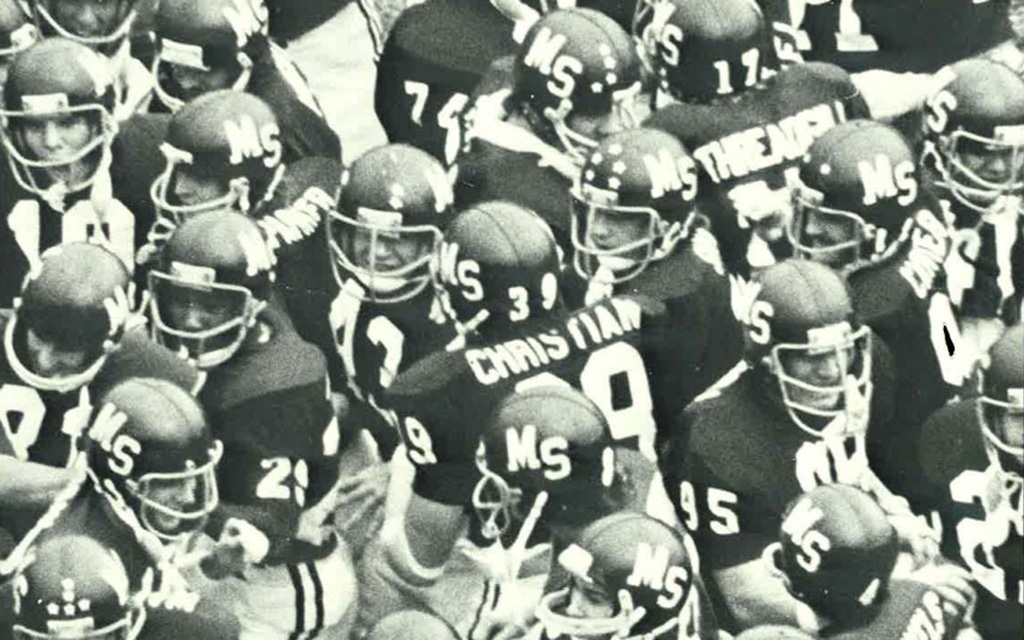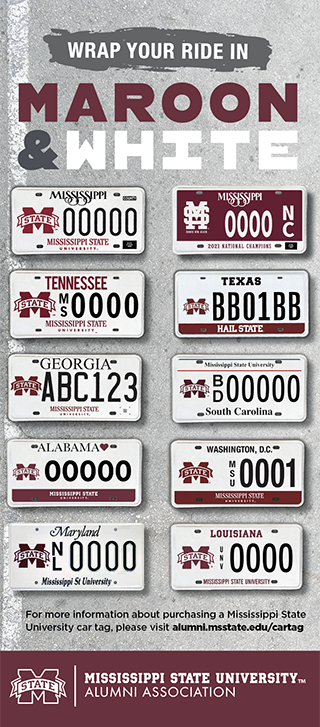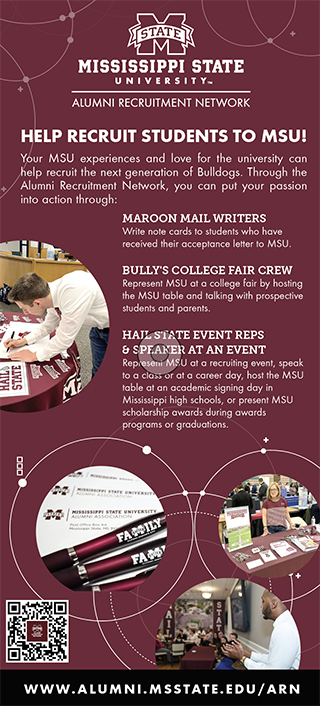The long-ago conversation from a campus cruise in Rockey Felker’s Pontiac is still vivid.
“We were riding in his car, just talking stuff,” Jimmy Webb says. “I remember him saying ‘Webb, we’re gonna run this thing, me and you.’”
What the quarterback told the defensive tackle that 1974 summer evening proved prophetic. By winter, Mississippi State had run Ole Miss off the field, Bob Tyler’s team was bowling and Bulldog football had come of modern age.
As Felker says now, “It was one time in your life in ’74 that there was a lot of excitement, cowbells were ringing and you were proud to be a Bulldog.”
Fifty falls later, all involved should stay proud. Not only football, Mississippi State athletics and the university can count 1974 as a “Before and After” benchmark. It is the season everything changed, and every student and athlete since has benefited.
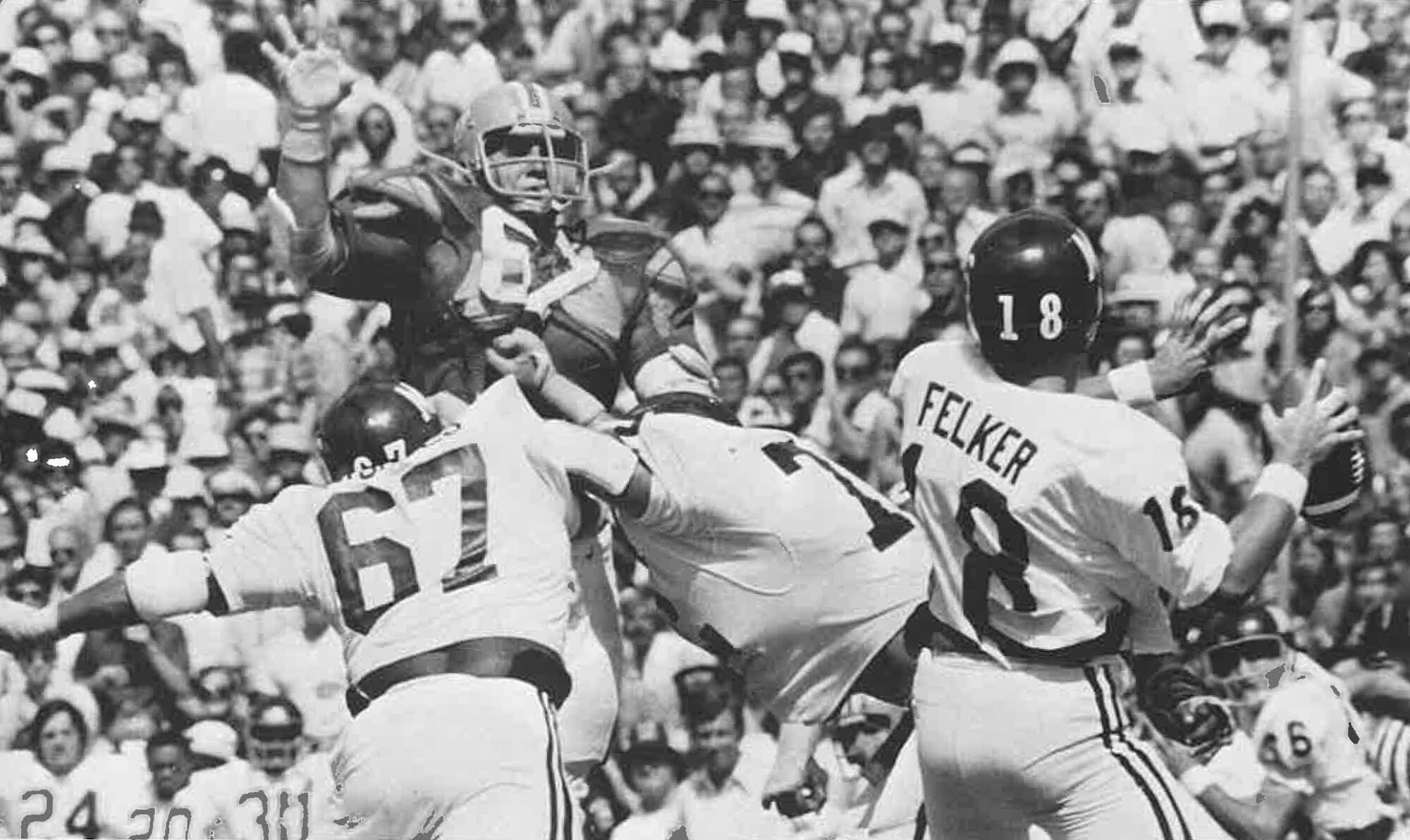
“We had a good year our senior year and it was quite memorable in all we did,” Webb said.
Mississippi State memorialized the team Sept. 21 on the field those Dogs called home. Time has taken the usual toll, and the man who put it all together was remembered posthumously.
Coach Bob Tyler died last April in Water Valley, where his own story began 91 years before.
His forever-highlight is what he achieved with a program mired for decades in mediocrity—or worse. Tyler did not claim any credit.
As he stated in his last interview, in September 2022, “I have heard it said that while we were here some things turned around.”
Not things. Everything.
“Mississippi State hadn’t won to speak of since the ’40s,” Felker said. “We were able to get a streak going and win some big games and some close games and have a very special year.”
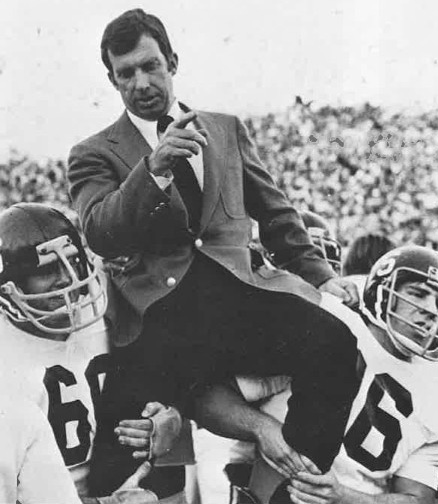
“Coach Tyler brought a belief that we could win,” Webb added. “He didn’t do a lot of the coaching; he believed in letting assistants do that. But he was a great motivator.”
Mississippi State desperately needed motivation to get out of its darkest ages. It’s worth noting that coach Charley Shira, who had one winning season out of seven and one victory over Ole Miss, did do much of the groundwork.
Despite the struggles, Shira began bringing in players with potential.
“He was kind of an old-school guy but just the kind of guy you’d play for,” Webb, a Florence native, said. “And we were able to get some pretty good talent in here.”
That lone win in the Battle for the Golden Egg? It had long-term results, too. Felker was the son of a State fan and grew up listening to Jack Cristil.
“I actually was on the sideline when State beat Ole Miss in 1970 in Oxford,” he said. “I knew I was going to be a Bulldog.”
So, Shira set a foundation with Felker, Webb, Steve Freeman, Bobby Wallace, Gerald Vaught, Calvin Hymel, and many, many more. The veterans who’d been through bad years like Wayne Jones, Frank Dowsing, Ken Phares, Bill Buckley and others pointed newcomers in the right direction. Webb particularly credits ground-breaker Robert Bell.
“He led me through a lot and took care of me, just a gentle giant,” Webb recalled.
Shira’s best single signing though was Tyler. After assisting at Ole Miss—including that 1970 team which State beat—and Alabama, he was ready to make the step up.
In that 2022 talk, Tyler remembered his mentors saying the Mississippi State job would be open soon.
“’If you can get it, it will be a plum, you need to get that Mississippi State job,’” he recalled. “And of course I knew something about this place.”
Tyler also knew Shira was ready to focus on athletic director duties. One other thing he knew: the core club just needed complementary talent. Tyler got it with forward thinking.

“He just brought in good people, period, good students, friends,” Webb said. “And he did not hesitate to recruit the good African American players. It benefited us because he brought in great players like Harvey Hull, Ray Costict and Larry Gillard, ready to play as freshmen.”
It also helped having a real Dog house in still-new McArthur Hall featuring air conditioning—no minor matter to all those Southern boys.
“And I got to sleep in that for five years,” Webb recalled, noting that they also dined together downstairs, which reinforced the team mentality. “I was just blessed to be with those guys and we did life together.”
With his “Let’s Win Something Today” theme, Tyler’s first season in charge was nearly a breakout before injuries, particularly to Felker, meant a 4-5-2 finish. Those Bulldogs knew how close they were, though, as the pair discussed on that summer evening drive.
Webb even recalls what was on the State playlist. “We had adopted a popular song that year that fit our purpose, ‘Saturday Night is Alright for Fighting.’ I’m not sure if our parents or pastors embraced it, but they got over it!”
Winning does absolve most sins, and the Bulldogs were winners. A thrashing of William and Mary and an open date tuned up the new “veer” option offense to take on the SEC’s other Bulldogs. Georgia came to Jackson, where State played more “home” games for the box office profits, and left 38-14 losers.
“Beating Georgia was a great start, and we not only beat them but dominated them,” Felker said.
Wins over Kansas State and Lamar sent State 5-1 to Memphis.
“The game might have been the turning point of the year,” Webb said.
Of an era, in fact. With the clock winding down, the Dogs trailed 28-21 and were dug back, deep.
“You’ve got 3:07 left and have got to go 98 yards, and you’ve never done it before,” Felker said.
They did, with Dennis Johnson bulling over the line at 0:49. Of course Tyler said go for the win and, of course, Felker was in charge.
“He says you guys block like crazy but I’m going to go in there, and if they tackle me before the goal line I’m gonna fumble the ball into the end zone,” Webb said.
As the replay shown every Scott Field game day proves, Felker made it in cleanly.
“So it worked out good that night,” Webb said.
Alabama, as usual, was too much to handle, and Auburn won a nail-biter. But the Bulldogs stuck to plan.
“Coach Tyler had a lot to do with the offense and Rockey was the guy that made it work,” said Webb. “And we had some skill players, myself and others on defense, that we could match up with those guys and stop them.”
State stopped LSU 7-6 before heading back to Jackson for the ultimate nemesis. Nerves showed early but the Bulldogs owned both lines of scrimmage in the 31-13 triumph. Thus, the image of the day, and perhaps the whole series’ history, was a giddy Webb holding the Golden Egg on high.
A copy of the photo still hangs in his garage.
“And I think Rockey has his hand on it if you look closely,” he noted.
There is a duplicate film reel of the whole game, too, which Webb’s father favored.
“We can pull that down and watch ourselves beat Ole Miss one more time,” he said.
Christmas found the Bulldogs at the Sun Bowl with thousands of their closest friends.
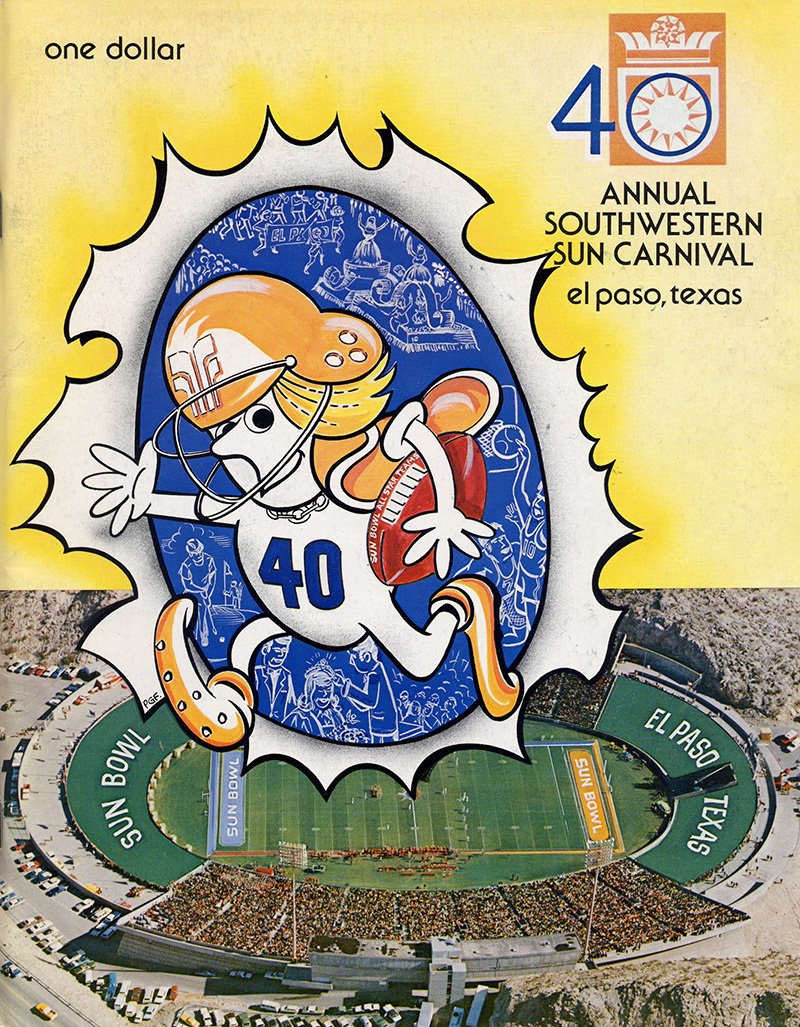
“The whole state of Mississippi was in El Paso,” Felker said.
The 26-24 comeback finished a 9-3 season which marked Mississippi State’s emergence.
The 1974 roster produced, over time, four All-Americans, a dozen All-SEC selections, professionals in football and professionals in life, too. Felker, of course, would stay in the game as a coach, eventually taking over his alma mater from 1986-90.
Felker surely set the table for Jackie Sherrill’s successes. After a return tenure with the athletic department and Bulldog Club, he has retired.
Webb was able to mix nine seasons in the NFL with off-seasons in the new College of Veterinary Medicine. He took his doctorate to Turlock, California, to specialize in cattle embryo transplants. Also just retired, he keeps a few cows on the home acres.
“We get the SEC channel, so we get to keep up with things,” Webb said.
Webb was inducted into the Mississippi Sports Hall of Fame this summer, joining Felker, 2019, and Tyler, 2022, representing the 1974 team. More off that roster should be added over time, and eventually see their names on MSU’s Davis Wade Stadium Ring of Honor. Or if the committee just chooses to hang a “1974” on the stadium, it will serve.
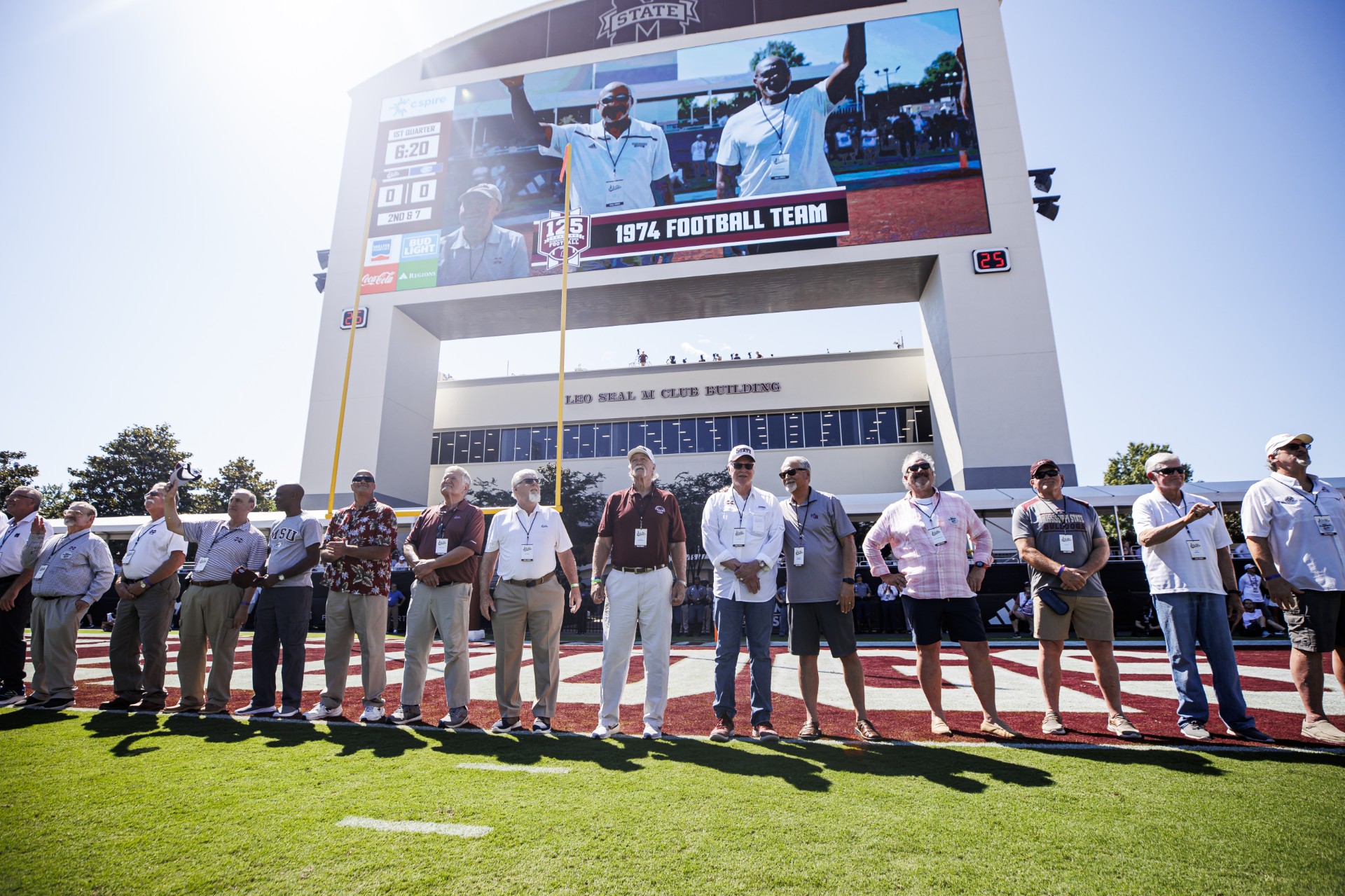
As Felker says, “It was a great time to be a Bulldog and a dream come true for me. I think back on it as one the best teams we’ve had at Mississippi State.”
It was certainly the transitional team for Mississippi State. Whatever the scores and records, since 1974 the Bulldogs don’t only wish to win. Bulldogs intend to win.
“It kind of started back with Rockey and that car ride,” Webb said. “As Rockey would say, ‘it’s all good.’”
Or as Tyler himself said in his final public appearance, “I thank God, bless this university … and let’s win something today!”
By David Murray
Winning the Games On and Off the Field
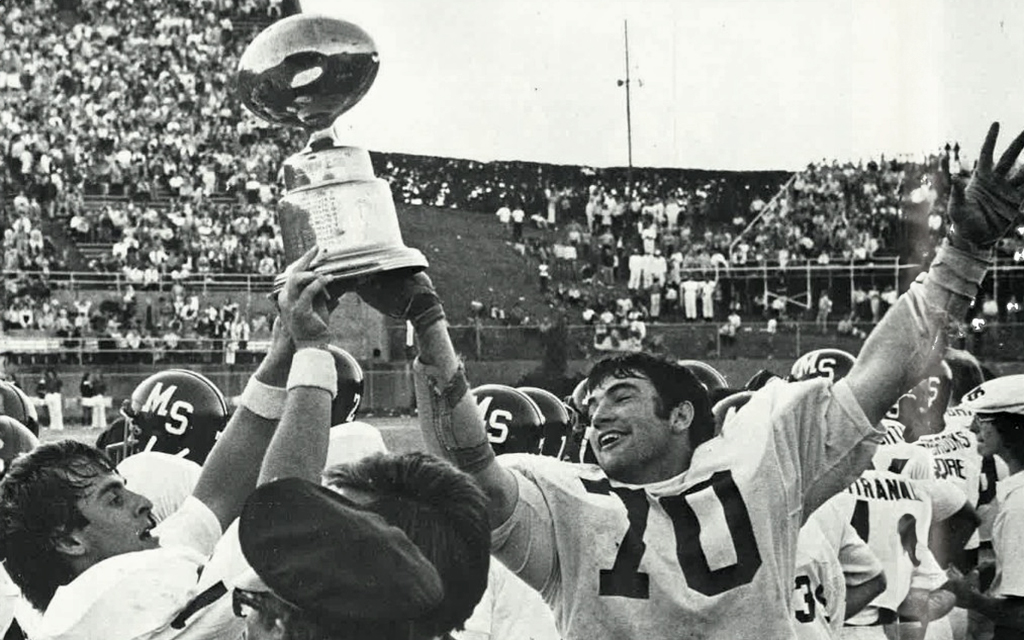
Did winning a football game also secure Mississippi State a Vet School? Well, this is Mississippi, and it was the Battle for the Golden Egg.
Let a firsthand witness tell how a wise old academic played his own game.
Jimmy Webb had been accepted as an alternate at Auburn’s vet school. But Mississippi State Dean Dr. James Miller saw a different future.
“Dr. Miller had gotten me to help them a couple of years before because it was a big item in the state legislature for the funding,” Webb said. “They knew I had signed up and I was going to play pro ball.”
Miller told Webb to apply for the first CVM class, plan on attending in the second, “and we’ll see you after your off-season.”
Simple? Not really. While the legislature approved founding Mississippi State’s vet school in 1974, the devilish details were still to be worked out. So, Miller played an ace.
“They had to lobby the legislature for funding. I had to go eat lunch with all the state senators,” Webb recalls. “And it was a good year for State to have beaten Ole Miss because the legislature was pretty heavy Ole Miss people!
“But they all figured it was good and got the thing passed,” he added.
Webb himself passed the necessary exams, enrolled and graduated in 1978—all while taking care of NFL business. He says his class included four “whiz kids” who knew the exotic stuff.
“And I was just a country guy with a degree in dairy science,” he explained. “They said you go catch the cows and we’ll draw the blood.”
That fine formula worked as five years later Webb had his doctorate.
“I don’t think there’s two or three of us who played pro football who are licensed vets! But it means a lot to me,” Webb said.
By David Murray


